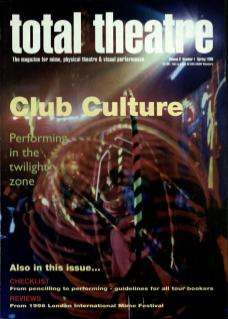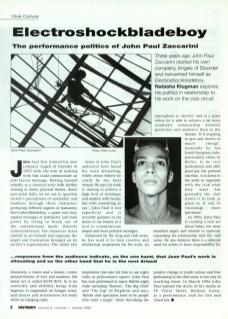John-Paul first formed his own company Angels of Disorder in 1992 with the aim of making work that could communicate an anti-fascist message. Having trained initially as a classical actor with further training in mime, physical theatre, dance and aerial skills, he set out to question society's perceptions of normality and madness through three characters portraying different aspects of humanity. Electroshockbladeboy, a queer rent boy, regaled messages of patriarchy and male power by trying to break out of the conventional mode. Directly confrontational, the character turns control in on himself and expresses the anger and frustration brought on by society's expectations. The other two characters, a clown and a lunatic, centre around themes of love and madness. His latest act is called Rope Boy. In it he erotically and skilfully hangs from trapezes, is suspended on bungee wires, and dances and interweaves his body while on hanging ropes.
Some of John-Paul's audiences have found his work alienating, whilst others believe he could be the next Artaud. He says his work is 'aiming to achieve a high level of technique and mastery with beauty but with something to say'. John-Paul is not superficial and is sincerely genuine in his desire to use beauty as a tool to communicate deeper and more political messages.
Influenced by the drug and club scene, he has used it to find creative and intellectual inspiration for his work, an inspiration that also led him to use nightclubs as performance spaces. John Paul has now performed in many British night clubs including Heaven, The Big Chill and The Zap in Brighton and says, 'British club spectators tend to be people who want a laugh', while describing the atmosphere as 'electric' and as a place where he is able to achieve a far more symbiotic relationship between performer and audience than in the theatre. 'It is inspiring to give and receive so much energy.' Generally he has found European clubs, particularly those in Berlin, to be very professional and offering good pay but pointed out that, 'it is down to the artist to negotiate with the club what they want but generally the club wants it to look as good as it can to encourage more spectators'.
In 1996, John-Paul is creating a new act about Satan, the most beautiful angel, and intends to continue expanding his relationship with the club scene. He also believes there is a definite need for artists to have responsibility for positive change in youth culture and that performing in the club scene is one way of reaching them. In March 1996 John-Paul opened the doors of his studio at 29 Vyner Street, Bethnal Green, as a performance club for live and visual arts.

